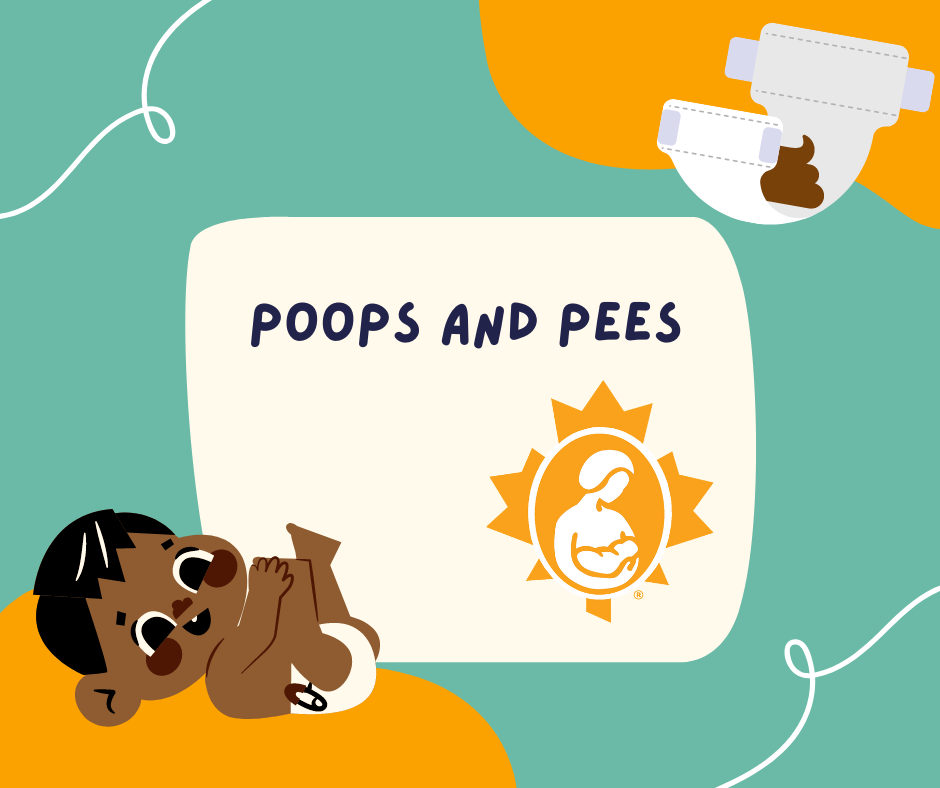
Once your baby arrives you may be surprised by how much time you spend thinking about your baby’s pees and poops!
What to Expect:
Days 1 & 2: Your baby may have only one or two wet diapers and one or two poopy diapers each day during the first or second day after birth. The first bowel movement will be black, tarry, and sticky; this is called meconium and is often difficult to get off a baby's bottom. This is the stool that was built up in his colon during pregnancy. There are natural laxatives in colostrum which help babies expel the meconium. The more breastfeeding your baby does in the early days, the more colostrum he takes in and the faster the meconium clears.
Day 3 to 4: You can expect your baby to have three to four wet diapers on Day 3. By Day 4 this will increase to at least four really wet diapers every 24 hours (more if you use cloth diapers). By the third day, the colour of the stool changes to a greenish transitional stool and increases to at least three green, brown or yellow poopy diapers each day.
Day 5-7: Your baby should continue to have at least six really wet diapers per day (more if you use cloth diapers). By the fifth day, babies begin having at least three bowel movements per day, each at least the size of a $2 coin (2.5 cm). The stools will typically be very loose and bright yellow in colour, often with a seedy appearance. In this period frequent feeding with good stool output is a sign of effective breastfeeding. Frequent feeding and a low number of poops is a red flag that the baby may not be latching and sucking effectively. Diaper output is a rough indicator of milk intake. Weight checks are more accurate.
Weeks 1-5: Diaper output changes over time. A bowel movement with every feeding is common in the early weeks. Three poops a day is average in the early weeks.
After 5-6 weeks: After five weeks of age, babies may have less frequent but larger bowel movements. Around six weeks of age some babies change their stooling pattern from very frequently to once a day. Some will stool only once every few days or even once a week. Some babies older than six weeks may go a week to ten days without having a poopy diaper. This is not a cause for concern as long as the baby is continuing to gain weight appropriately. Your exclusively breastfed baby is not constipated as long as the poop is still loose (pudding-like) and a mustard yellow colour when he does have a bowel movement. The poops should also be substantial. (Remember: the longer it has been between poops, the bigger it will be.)
Green Poops
As your baby gets older, an occasional greenish diaper is nothing to be concerned about as long as your baby is happy, eating and gaining well, and there is no sign of blood in the diaper. Some babies have frequent green, frothy poops. This can occur for several reasons. It could mean that your baby is not fully emptying the first breast before moving to the second breast. When this happens the high amount of lactose in your milk causes the milk to move through your baby's digestive system very quickly and can result in green poop. Your baby needs to balance the high amount of lactose in the watery milk at the beginning of the feeding with the fattier milk that comes later in the feeding. This may happen if you have an especially forceful letdown or an overabundant supply of milk. If your baby is otherwise healthy, happy, and gaining weight, nothing needs to be done. If you have an oversupply of milk and find that your baby is struggling to manage it, see Oversupply and Forceful Letdown.
Green mucousy poops can be a sign that your baby's intestines are irritated. If your baby is still happy and eating and sleeping normally then you can probably wait a day or two to see if things get better. If the poops return to their previous colour and frequency, it might mean that your baby had a mild virus or a reaction to something you ate, or a medication your baby is taking. Teething may also be the culprit. When your baby swallows a lot of drool, it can irritate the intestines and cause some mucus in the poop.
Green watery poops with a foul odor can be a sign of diarrhea, especially if they are much more frequent than usual. Baby diarrhea can be caused by a virus, infection, stress or food intolerance. Babies can get dehydrated quickly when they have diarrhea. In this case, consult your healthcare provider.
Your baby’s pee and poop output can provide helpful information about how much milk your baby is drinking. The best way to know your baby is getting enough milk is weight gain that is appropriate for your baby’s age. If you are concerned about your baby’s weight gain consult your healthcare provider. You can also contact a La Leche League Leader for additional information and support.
Updated Nov 2022

